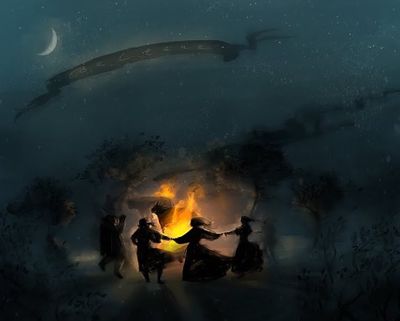Template:Featured Tune: Difference between revisions
No edit summary |
No edit summary |
||
| Line 3: | Line 3: | ||
<p><font face="Century Gothic" size="2"> | <p><font face="Century Gothic" size="2"> | ||
<div style="text-align: justify; direction: ltr; margin-left: 0pX; margin-right: 0px;"> | <div style="text-align: justify; direction: ltr; margin-left: 0pX; margin-right: 0px;"> | ||
[[File:Beltaine.jpg| | [[File:Beltaine.jpg|400px|link=|left|The day of the mouth of the fire]] | ||
The first of May was traditionally a day for romance and was important in ancient times as the date of the festival of La Bealtaine (the day of the mouth of the fire), one of the most important Celtic celebrations. During Bealtaine ceremonial fires would be lit on either side of a path and cattle driven up the middle to purify them for the coming year and to help protect them against disease and insure their health. | The first of May was traditionally a day for romance and was important in ancient times as the date of the festival of La Bealtaine (the day of the mouth of the fire), one of the most important Celtic celebrations. During Bealtaine ceremonial fires would be lit on either side of a path and cattle driven up the middle to purify them for the coming year and to help protect them against disease and insure their health. | ||
<br> | <br> | ||
Revision as of 14:11, 29 April 2019

The first of May was traditionally a day for romance and was important in ancient times as the date of the festival of La Bealtaine (the day of the mouth of the fire), one of the most important Celtic celebrations. During Bealtaine ceremonial fires would be lit on either side of a path and cattle driven up the middle to purify them for the coming year and to help protect them against disease and insure their health.
Philippe Varlet says the tune was quite popular during the 78 RPM era and was recorded by Tom Ennis, Packie Dolan, and the Flanagan Brothers, among others. O'Neill (1913, p. 132), Bayard (1981) and Emmerson (1971) all say this double hornpipe is either a derivative, a variant, or development from a common ancestor of the jig tune known as "Fágamaíd Súd Mar Atá Sé" (Let us leave that as it is), also known as "Galbally Farmer (The)," "Get Up Early," "Rakes of Kildare (The)," "Old Barndoor Jig (The)," and "Barndoor Jig (The)." The melody, points out musician and researcher Don Meade, was also employed as the vehicle for several songs, including "The Little Skillet Pot"/"Colcannon." Set as a reel, the "First of May [1]" was included in vol. 2 of the large mid-19th century music manuscript collection of County Cork cleric and uilleann piper biography:James Goodman.
The group Téada recorded the tune as "Mayday Hornpipe (The)." See note for "annotation:Arthur's Seat (2)" for another association to the first of May.
"The First of May" also shows up in Ireland as the first tune in a medley of flings called "The Four Provinces."
The title is among those mentioned in Patrick J. McCall's (who co-edited the 1914 Feis Ceol Collection) 1861 poem "The Dance at Marley," the first three stanzas of which goes:
Murtagh Murphy's barn was full to the door when the eve grew dull,
For Phelim Moore his beautiful new pipes had brought to charm them;
In the kitchen thronged the girls – cheeks of roses, teeth of pearls –
Admiring bows and braids and curls, till Phelim's notes alarm them.
Quick each maid her hat and shawl hung on dresser, bed, or wall,
Smoothed down her hair and smiled on all as she the bawnoge entered,
Where a shass of straw was laid on a ladder raised that made
A seat for them as still they stayed while dancers by them cantered.
Murtagh and his vanithee had their chairs brought in to see
The heels and toes go fast and free, and fun and love and laughter;
In their sconces all alight shone the tallow candles bright –
The flames kept jigging all the night, upleaping to each rafter!
The pipes, with noisy drumming sound, the lovers' whispering sadly drowned,
So the couples took their ground – their hearts already dancing!
Merrily, with toe and heel, airily in jig and reel,
Fast in and out they whirl and wheel, all capering and prancing.
"Off She Goes," "The Rocky Road," "The Tipsy House," and "Miss McLeod,"
"The Devil's Dream," and "Jig Polthogue," "The Wind that Shakes the Barley,"
"The First o'May," "The Garran Bwee," "Tatther Jack Welsh," "The River Lee," –
As lapping breakers from the sea the myriad tunes at Marley!
Reels of three and reels of four, hornpipes and jigs galore,
With singles, doubles held the floor in turn, without a bar low;
But when the fun and courting lulled, and the dancing somewhat dulled,
The door unhinged, the boys down pulled for "Follow me up to Carlow."
THE FIRST OF MAY full Score(s) and Annotations and Past Featured Tunes
X:1 % T:First of May [1], The M:C| L:1/8 R:Reel S:Rev. James Goodman music manuscript collection (vol. 2, p. 159) N:Canon Goodman was a uilleann piper and cleric who collected primarily N:in County Cork in the mid-19th century Z:AK/Fiddler’s Companion K:Amin AG|EAAA cAAA|dcde f2 ef|gfed defd|dcAF G2z2| EAAA cAAA|dcde f2 ef|gfed cAdc|A2 AA A2:| fg|agfa afeg|fedf e2d2|cdef gfed|dcAF G2 z2| EAAA cAAA|dcde f2 ef|gfed cAdc|A2 AA A2:||
